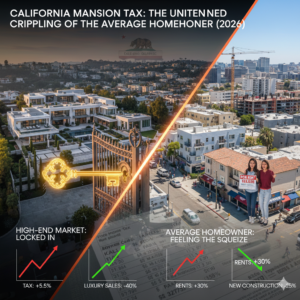Last Tuesday, Housing Starts for April came in at an annual rate of 458,000 units, a drop of 12.8%. Ignored by the media was the fact that ALL the decline came from a 46.1%Â drop in multiple-family starts, which are volatile from month to month. Single-family home starts were actually UP 2.8% for April. Building permits, a harbinger of future starts, fell 3.3% in April, to a 494,000 unit annual rate. But this was also ALL due to a drop in multiple-family units. Permits for single-family homes were actually UP 3.6%.
The volatility of multiple-family starts makes it likely that April’s move down will be followed by a May rebound. The trend to note is that single-family starts are climbing. After bottoming in January and staying flat for February, they’re now UP two months in a row. Experts say the recovery in starts will begin gradually, given the size of excess inventories. Some also say a major home building turnaround could begin late this year. The fact i s, with population growth and knock-downs, we’ll need about 1.6 million starts a year (a 250% hike!) just to return to normal. No wonder the Builder Confidence index shot up two points in May, to its highest level since last September.
Finally, a recent survey of realtors revealed only 29% felt home values would decline in the next six months, while half think they’ll stay where they are – and 22% see home values rising! So there.
>>Â Review of Last Week
INCHING UPWARD… Things started off in the markets very nicely last Monday, but as the week wore on, stocks lost ground as they reacted to some of the less encouraging developments being reported. But these were offset by positive news items whose influence prevailed enough to keep all three indexes ahead (barely) when things closed down Friday for the holiday weekend.
Might as well get the negatives out of the way. The fall in housing starts and building permits disturbed investors in spite of the upward trend in single-family activity covered above. Although weekly initial unemployment claims were down, as they have been for three of the last four weeks, continuing claims remained high, at 6.6 million. Wednesday the minutes from the Fed’s April meeting came out with lower real GDP projections for this year, 2010 and 2011. The U.K.’s sovereign debt rating outlook was downgraded to negative, which hurt the dollar and boosted commodities like crude oil which went up over 9%.
So enough with the sad stuff. The week began with Bank of America getting its stock added to Goldman Sachs’ Conviction Buy List. Then home improvement retailer Lowe’s came in with better than expected earnings and guidance. A slew of other retailers also beat quarterly earnings estimates, including Target, Saks, TJX, Home Depot, Sears and Gap. Guess consumers actually are out there spending!
Things are still far from normal, so the Dow squeaked up a scant 0.1% for the week, to 8277.32; the S&P 500 gained 0.5%, to 887.00; and the NASDAQ went up 0.7%, to 1692.01.
Prices in the bond market were under pressure in a shortened session Friday, though things weren’t too bad for the mortgage backed security we watch most closely. The FNMA 30-Year 4.0% bond, which is closely tied to mortgage rates, ended Friday at $99.41, down 12bp. Mortgage interest rates fell slightly last week, remaining below 5% for more than two months, as tracked by20Freddie Mac’s weekly survey of conforming mortgage rates.
This post information was provided by: Greg Brooks southwest area manager San Diego Mortgage Network (800) 287-8292 x 225 San Diego real estate






Everyone likes to talk about the foreclosures as if it’s a bad thing when the reality is that it’s an incredibly good thing. All the bad loans inflated the market well beyond what it should have been. As these people default on their bad loans the price of housing corrects, as it should, and maybe the rest of us get to buy. This story is good news and it should be reported as such. Or, would we all be better off if the government steps in and inflates pricing again.
San Diego lasik surgery
Thanks for this information. There have been a number of published studies or reports that there are expected to be more foreclosures in 2009 because of the high number of “exploding type” loans set to go off next year. So predicting exactly when this phase will slow down or come to an end is, therefore, very difficult. We have had a number of students advise they have loans which will “explode” in 2009 and 2010 (it hurts to see this, as most of these folks could have avoided these types of financing deals had they only bothered to learn something about real estate before diving into it without the knowledge they’d most likely have picked up in any good Real Estate Principles course
Austin bankruptcy lawyers
Why do we think jeopardizing our country’s future for short term gain is a good idea? As a whole, Americans live beyond their means and rely on….credit. You can’t expect Uncle Sam to “fix” all of your personal finance problems. Time to let the chips fall where they may…
San Diego implant dentist